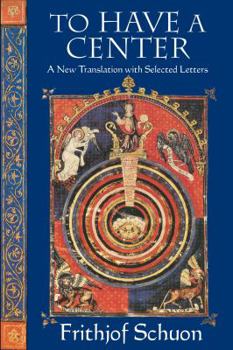Avoir un centre
In this new edition of his powerfully original work, Schuon covers an array of metaphysical, cosmological, and anthropological subjects. In the book's signature essay, entitled "To Have a Center," the author surveys the ambiguous phenomenon of modern genius, showing how Western humanistic society has replaced the time-honored veneration of the saint and the hero with the cult of individualistic "genius." In other notable essays, Schuon deals with the relation between intelligence and character, the distinction between historical Gnosticism and pure gnosis, the degrees and dimensions of theism, the spiritual messages of David, Shankara, and Honen, and the symbolism of Plains Indian vestments. This revised edition, containing over 65 pages of new material, features a fully revised translation from the French original as well as previously unpublished selections from Schuon's letters and other private writings. Also included are editor's notes, a glossary of foreign terms, and an index.
Format:Paperback
Language:English
ISBN:1936597446
ISBN13:9781936597444
Release Date:July 2015
Publisher:World Wisdom Books
Length:224 Pages
Weight:0.70 lbs.
Dimensions:0.6" x 5.8" x 9.0"
Customer Reviews
2 ratings
Interesting Viewpoint
Published by Thriftbooks.com User , 21 years ago
I've been an admirer of Schuon for many years. I find his comments on esotericism to be some of the most sublime and thought-provoking to be found in print. In this work we are moving somewhat off the subject of esoteric religion per se and moving into the realm of the development of culture, and cultures.Readers of Schuon's other works will recognize this as one of his favorite topics, and in this book he allows himself the space to tackle the subject in depth. In general, Schuon is in agreement with Guenon regarding the decline of culture, and particularly Western culture, holding that for various reasons modern Western culture has become truly "pagan." He then proceeds to dissect the phenomenon of identifying "genius" and what it constitutes, and indeed it is particularly interesting to consider that the idea of genius seems to be one that is a Western preserve.The part when I began wondering whether I was willing to keep pace with Schuon, however, was when he started dissecting individual examples of Western "genius", and serving up his opinion on the quality (or lack of it) in their work. I am not at all comfortable with the idea of consigning artists like Tolstoy and Balzac to the rubbish bin, mainly apparently because they were novelists and were very good at it, while extolling composers like Georges Bizet for his presumed use of a musical tradition dating back to the troubadors.I won't say that Schuon's comments weren't interesting; interesting enough, in fact, for me to question my own taste in books, painting and music somewhat, but in general I have to say that while it would have been interesting to sit down with Schuon and discuss all these things, this book seemed to me to pontificate a bit too much on particulars.
Fascinating, Engaging, Unique
Published by Thriftbooks.com User , 22 years ago
This has to be one of Schuon's most fascinating and engaging books. The title is taken from the opening chapter which deals with, among other things, the phenomenon of genius. From Beethoven to Einstein, from Dante to Ghandi, Schuon looks at what famous men and women have bequeathed to us and why they are admired. The analyses are often surprising. They arise from what Schuon describes in another chapter as "integral anthropology." This rather dry-sounding phrase in fact sums up an amazingly rich description of the very diverse possibilities of human nature. Body, soul, spirit, race, gender, age, caste, even astrological types are considered. This is a tapestry of all the many-hued "wefts" of humanity as they combine with the vertical "warp" of spirituality. As Schuon writes, "There is no science of the spiritual without a science of the human." This book reveals a very different side of Schuon's own genial talents.






